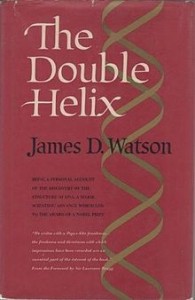В далёком 1972 г. в ХиЖ (№ 1) был опубликован перевод беседы с Максом Дельбрюком. Там он высказал немало парадоксальных суждений, например что в науку идут (во всяком случае, в прошлом, когда она ещё не стала массовой) неприспособленные к жизни маргиналы и что лично у него научные дела продвигались тем лучше, чем хуже были условия для этого; Дельбрюк уподобил учёных персонажу ирландского писателя-абсурдиста Сэмюэла Беккета Моллою — бродяге и калеке, ищущему способ наилучшей раскладки по карманам камешков, которые он любит обсасывать. Возможно, этот писатель был близок Дельбрюку по духу, одно из высказываний Беккета: «На свете нет ничего стоящего, кроме творчества». Кстати, Дельбрюк (вместе с С. Лурией и А. Херши) и Беккет одновременно, в 1969 году, получили нобелевскую премию. (Этот материал из ХиЖ представлен на нашем сайте: <ДельбрюкХиЖ>.)
А в 1978 г. обширное интервью у Дельбрюка взяла Кэролайн Хардинг (оно хранится в архиве Калтеха): <ИнтервДельбрюк>. Привожу фрагмент из него (чуть сокращённый), где Дельбрюк говорит о «Двойной спирали» Уотсона. Как я уже отмечал (на примере отклика Джона Мэддокса <Мэддокс>), книга встретила неоднозначный приём.
 HARDING: What did you think of The Double Helix?
HARDING: What did you think of The Double Helix?
DELBRUCK: …He showed the manuscript to quite a number of friends of his before it was published, and I thought it was an important confession on his part, that it was a need for him. People have criticized that he says so many nasty things about other people, but the thing that strikes me most is that he says nastier things about himself than about anybody else, and he obviously had a need to do so. I was surprised by the book, because there are many nasty things about himself I was not aware of, although I thought I knew him. I think my letter was just a formal criticism; the book was written when he was about 37, and is about the time when he was 23, and often as you read the book you don’t know who is speaking, the boy of 23 or the man of 37. But he said, «Never mind. It has to be vigorous writing. I wanted to really write a readable book, not a scholarly book.» And I guess it was a point well taken.
HARDING: Did you read the book about Rosalind Franklin that came out a few years ago?
DELBRUCK: No. I am not interested in this controversy. Why should I worry about guilt or no guilt? I mean if Jim was worried about his guilt, and writes a book about it, that’s fine. And that’s a readable book and that’s a genuine book because he writes about it. I think these questions of credit for this and credit for that are not very interesting in science. In the end the personalities are really irrelevant to the science itself. What remains… is the science, and not who contributed what. It’s a different thing if you want to write a biography of that person, but that’s quite separate from the science.
HARDING: Although you may read The Double Helix primarily as a confession by James Watson, it seems that many people, and especially many nonscientists, read The Double Helix as this is the way science is done. In fact science is not what you read in the textbooks, or science is not the pure search for knowledge, but is rather this race to see who can find the answer first.
DELBRUCK: I think science is done many different ways, and I think that Jim’s presentation represents one way that is real for a certain section, but it is not representative of all of them. Anybody can figure that out for himself. You can’t expect Jim to write representative for all scientists. I certainly think that the way the development of science is represented in most textbooks is completely asinine; I mean at least the way I have seen it presented as progressing from hypothesis via experiment to conclusion or something like that. The progress of science is tremendously disorderly, and the motivations that lead to this progress are tremendously varied, and the reasons why scientists go into science, the personal motivations, are tremendously varied… science is a haven for freaks, people go into science because they are misfits, and it is a sheltered place where they can spin their own yarn and have recognition, be tolerated and happy, and have approval for it.
